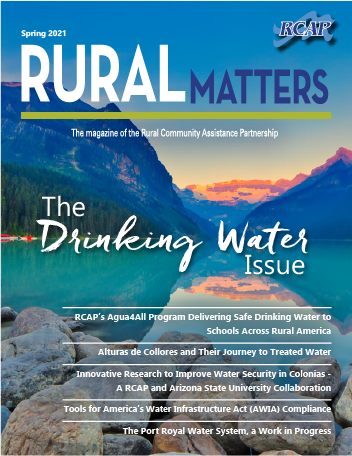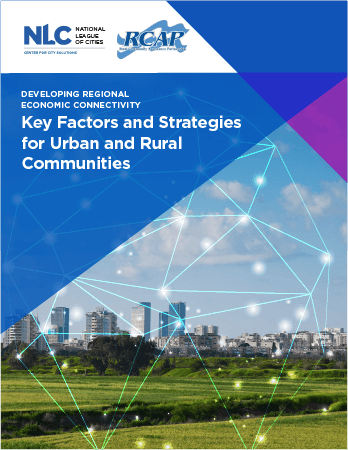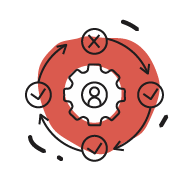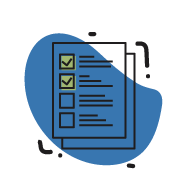RCAP’s national Fly-In brings together our six regional partners to generate awareness for rural issues with members of Congress, their staff, and the administration in Washington. The 2021 Fly-In was held virtually on February 22–25 and included over 270 meetings. RCAP honored Congressman Sanford Bishop (D-GA-2) and Senator Chuck Grassley (R-IA) as our 2021 Congressional Champions, an annual bipartisan congressional award chosen by RCAP’s regional partners and given to policymakers who have gone above and beyond in supporting policies that benefit small and rural communities and taking actions to make them a reality.
Foreword
Character is shaped and redefined through times of hardship, which has been true for us, especially regarding the tremendous people and communities we have had the honor of journeying with this past year. 2021 moved the Rural Community Assistance Partnership (RCAP) from overcoming and navigating crises to doubling down on our efforts to work with and serve even more small, rural, and tribal communities across the country than ever before. This past year was also about reflection. We reflected on how we might make the most of the historic challenges and opportunities before us to truly hear, elevate, and address rural America’s diverse and compelling voices and needs.

About RCAP
RCAP is a national network of nonprofit partners working with small, rural, and tribal communities to elevate rural voices and build local capacity to improve quality of life – starting at the tap. Our more than 300 technical assistance providers (TAPs) act as trusted primary care providers in the training and technical assistance they provide. TAPs are locally based, and with deep trust built over time, we meet communities where they are to co-develop solutions to challenges that matter most to them. Our TAPs annually work in over 2,500 small, rural, and tribal communities in every U.S. state, the U.S. territories, and tribal lands on issues ranging from gaining access to safe drinking water to creating economic development opportunities that can improve livelihoods and well-being.
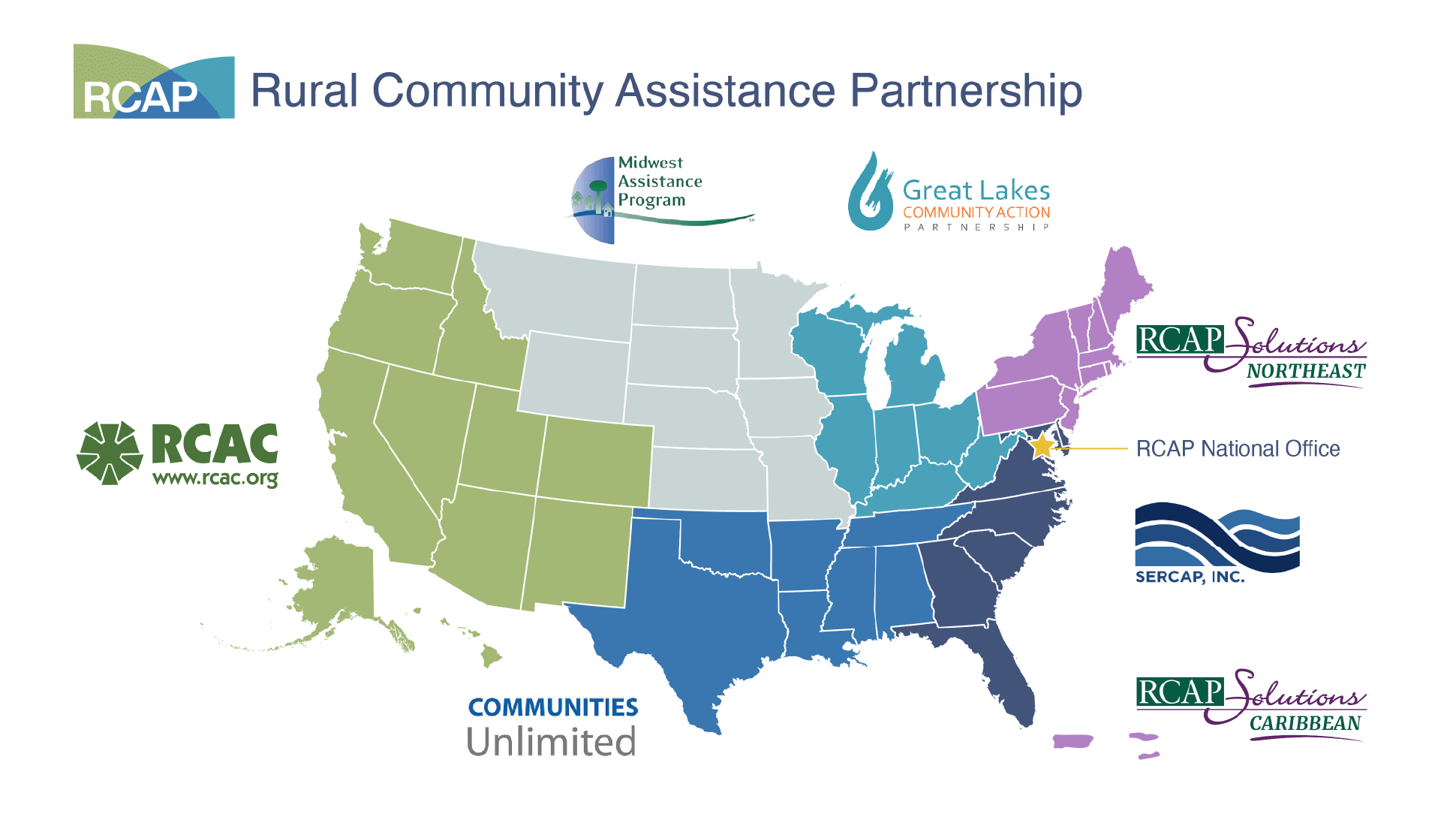
A Snapshot of Our Communities
RCAP works with communities that few others serve and where help is most needed. In FY 2021, we served 2,503 unique communities. Those communities looked like:
AVERAGE POPULATION
1,636


AVERAGE MEDIAN HOUSEHOLD INCOME (MHI):
$39,498
(which is 58% of the US national MHI)% OF COMMUNITIES WITH 3,300 OR FEWER POPULATION:
86%
Impact by the Numbers
-
In FY21 RCAP Served
In FY21 RCAP Served
-
4,340,000
PEOPLE
4,340,000
PEOPLE
-
1,320,000
PEOPLE OF COLOR
1,320,000
PEOPLE OF COLOR
-
344,000
TRIBAL MEMBERS
344,000
TRIBAL MEMBERS
-
1,320,000
PEOPLE OF COLOR*
1,320,000
PEOPLE OF COLOR*
-
457
WELL ASSESSMENTS PERFORMED That’s 457 households that better understand how to protect their groundwater for safe drinking water for their family.
457
WELL ASSESSMENTS PERFORMED That’s 457 households that better understand how to protect their groundwater for safe drinking water for their family.
*In the spirit of diversity, equity, and inclusion, we must understand the populations we work with and how we can do better to serve them. Though this is continuously evolving, we’ve used the term “people of color” as a currently accepted term to include (but is not limited to) people who identify as Indigenous or Alaska Native, Asian, Black, Hispanic or Latino, Middle Eastern or North African, Native Hawaiian or Pacific Islander, and/or Multiracial.
Trainings
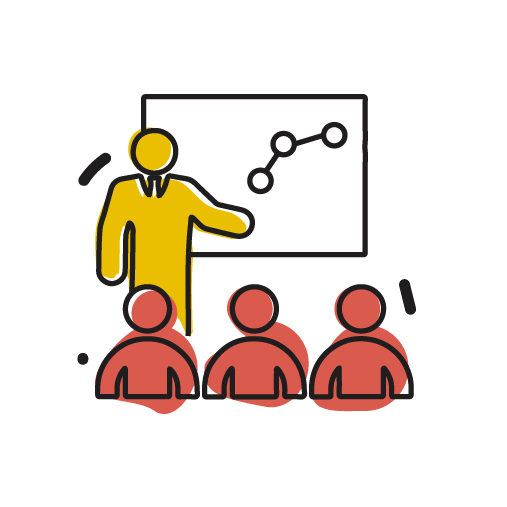
Trainings

Trainings

Trainings
$400 million
in leveraged funding for small, rural, and tribal communities
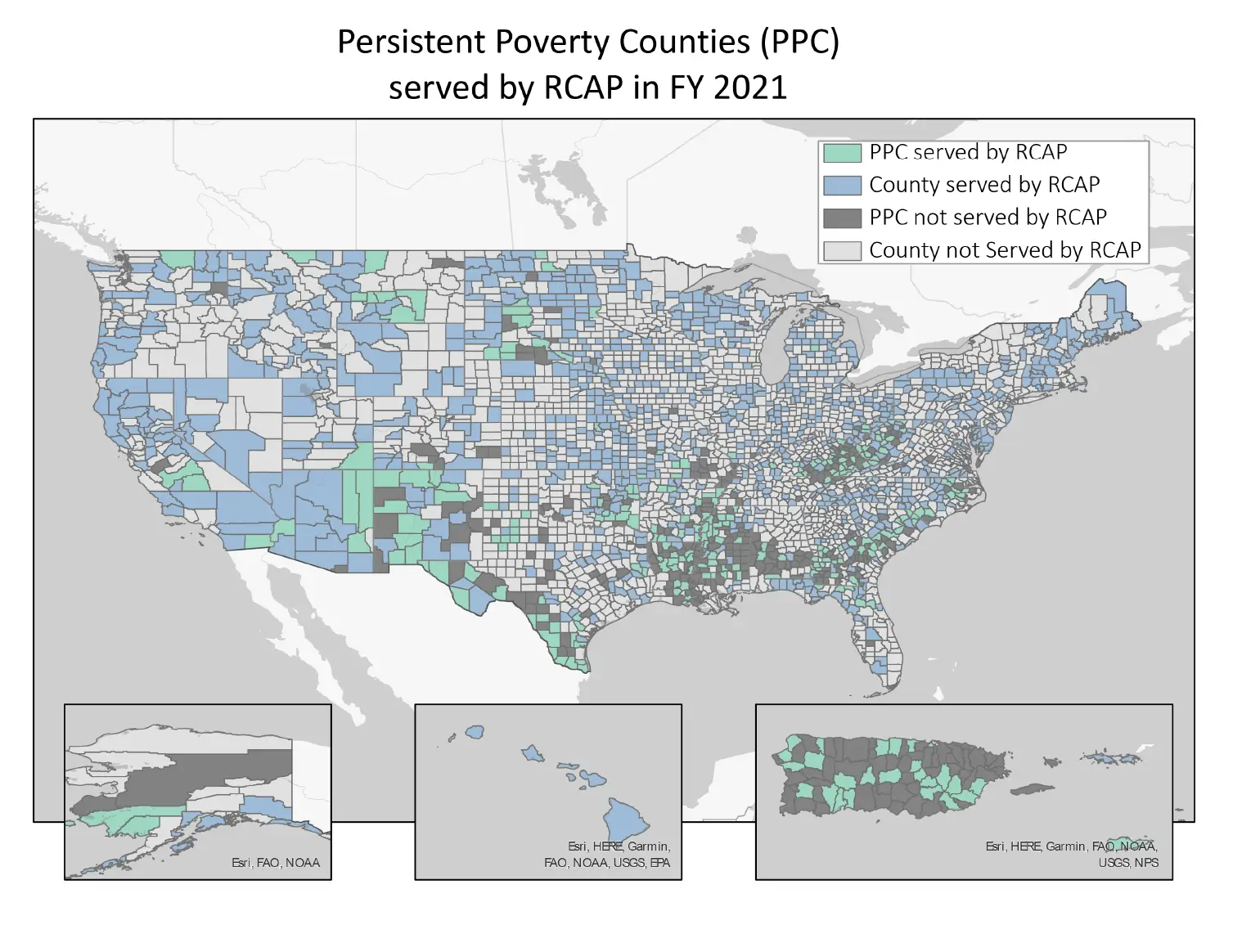
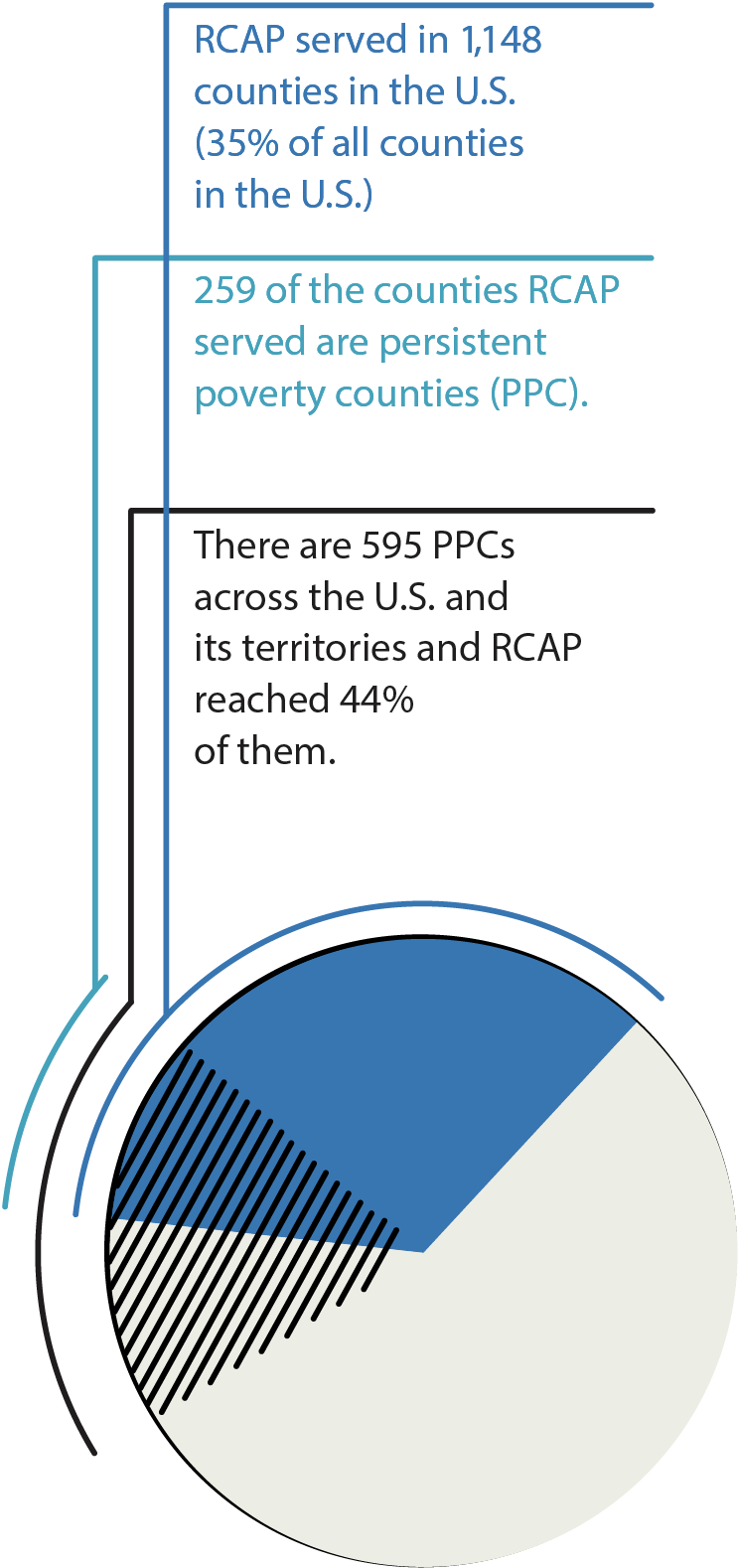
Where We Worked
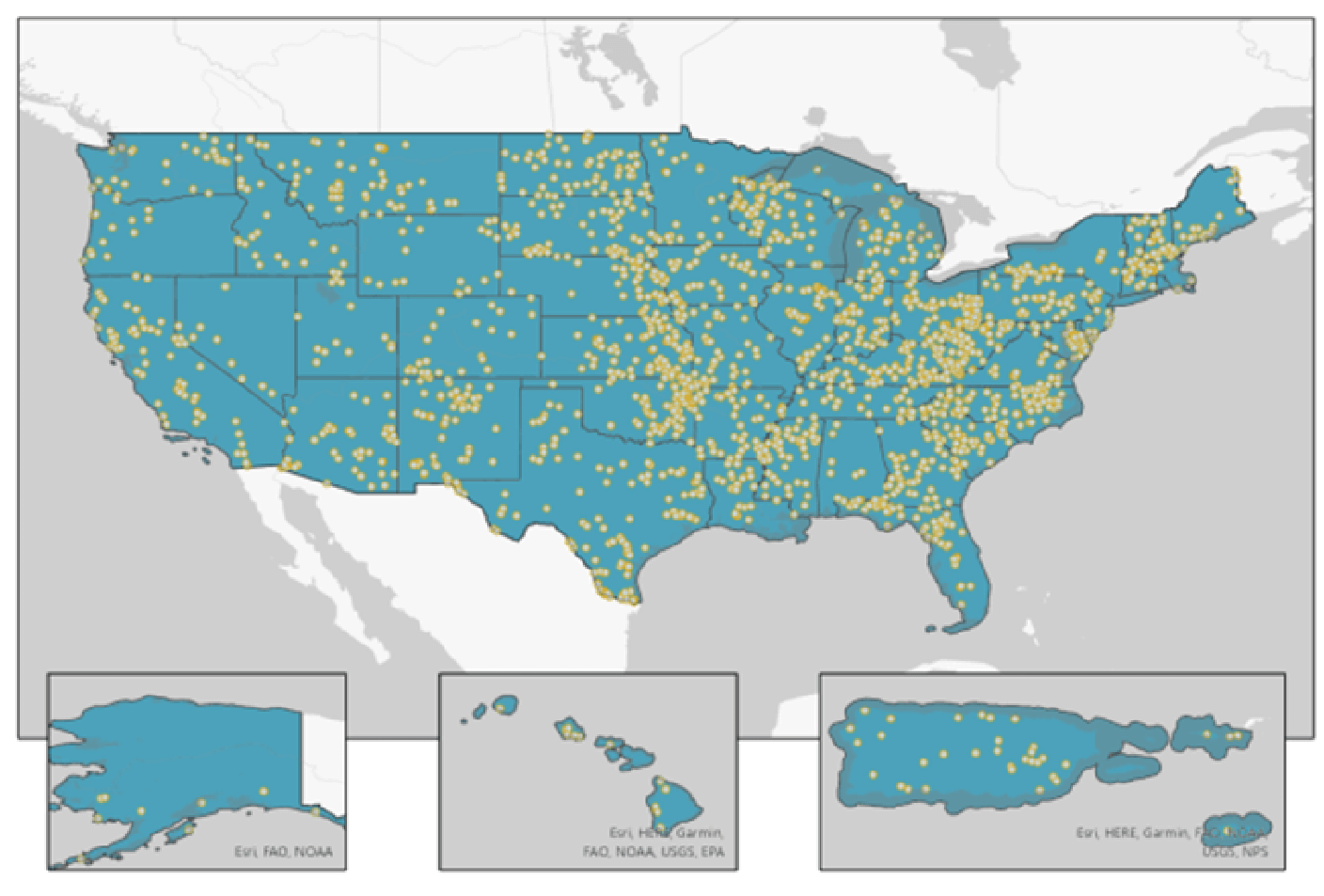

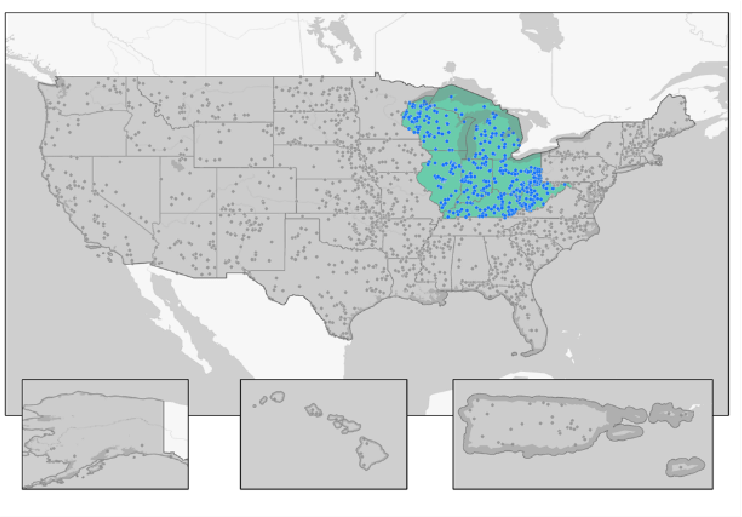

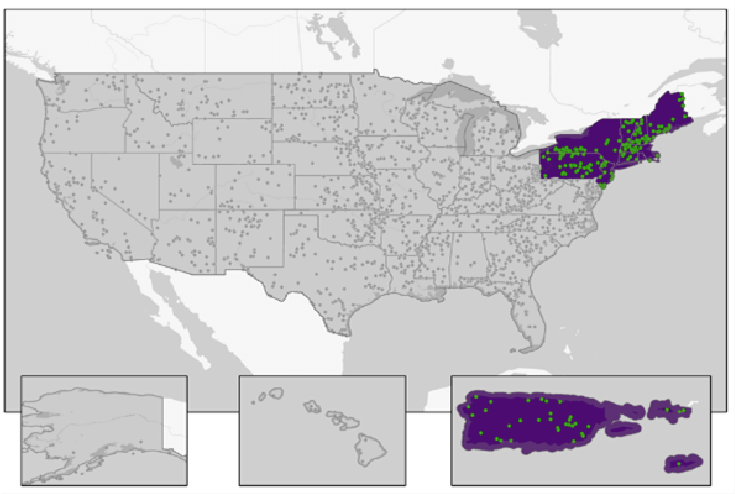


| Region | Number of Projects | Population Served | Communities Served | POC Served | % POC Served | Low Income | % Low Income | MHI |
|---|---|---|---|---|---|---|---|---|
| CU | 399 | 780,000 | 430 | 331,000 | 42 | 191,000 | 25 | 37,580 |
| GLCAP | 512 | 953,000 | 550 | 96,000 | 42 | 220,000 | 23 | 38,160 |
| MAP | 411 | 596,000 | 480 | 195,000 | 33 | 175,000 | 29 | 42,435 |
| RCAC | 331 | 857,000 | 360 | 352,000 | 41 | 249,000 | 29 | 40,530 |
| RSOL | 248 | 435,000 | 290 | 86,000 | 20 | 96,000 | 22 | 44,875 |
| SERCAP | 365 | 717,000 | 390 | 261,000 | 36 | 196,000 | 27 | 35,620 |
Building on the Basics
Water is life. Safe drinking water is fundamental to our lives, and we can’t live healthy lives without it. Yet it’s hard to believe that over 2 million people in the U.S. still lack reliable access to clean, safe drinking water, indoor plumbing, and basic infrastructure to support this access. That’s why RCAP’s technical assistance and training is one of our first interventions.
We support small, rural, and tribal communities across the country in gaining and sustaining safe, affordable, and reliable access to drinking water and the systems that manage waste to protect public and environmental health. The work begins with understanding and listening to each community’s unique needs, challenges, and strengths. We then work together to comply with state and federal water and wastewater regulations, deliver training that builds technical, financial, and managerial capacity, and secure funding for an infrastructure project. Our ultimate goal is to equip communities with the tools and resources to help them meet their goals and thrive in the future.
Upgrading Drinking Water Systems
RCAP continues to support rural communities and their drinking water systems. Our Spring 2021 issue of Rural Matters highlighted a few projects our Technical Assistance Providers (TAPs) have helped communities with. For example, RCAP Solutions TAPs helped Alturas de Collores in Puerto Rico find funding for and install a chlorination system. The community is now on its way to having safe, treated drinking water.
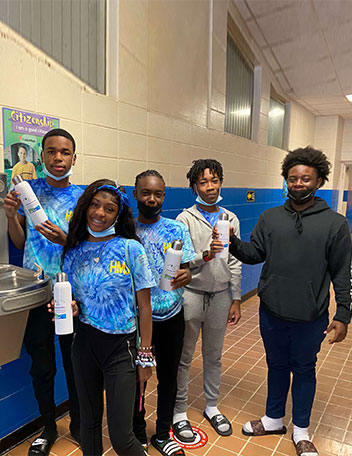
Safe Drinking Water In Schools
This year RCAP expanded its Agua4All program to help bring safe drinking water to even more schools across the U.S. The program includes solutions like installing bottle filling stations in schools and education to promote the health benefits of safe drinking water. Eight states implemented Agua4All, and new partnerships and funding are on the horizon. Read more about Agua4All.

Supporting Improvements In Wastewater Systems In Rural Communities
Learn more about the impact RCAP’s technical assistance providers have had on rural wastewater systems across the country.

Improving Livelihoods,
Promoting Rural
Prosperity
Addressing economic development and livelihoods is core to helping small, rural, and tribal communities thrive. RCAP leads several initiatives to support community-centered approaches that promote rural prosperity. Learn more about RCAP’s Community and Economic Development programming at rcap.org/economic-development-programs/.
Rural Economic Development Innovation (REDI) Initiative
In 2018, RCAP was one of four partners chosen by the U.S. Department of Agriculture (USDA) Rural Development Innovation Center to launch the Rural Economic Development Innovation (REDI) program in rural communities across the U.S. The REDI program helps develop the rural economy and supports rural quality of life through its activities. From 2019 to 2021, RCAP and its partners worked with 30 communities in 21 states to develop and implement actionable community and economic development plans, unlocking $4.9 million in federal, state, and private funding.
Read the final REDI report.
Supporting Foundational Skills and Resources to Succeed
In 2021, our training work included more systems and attendees than ever before. During the pandemic, we continued to innovate to provide services to communities, even during lockdowns. We were able to shift more trainings online – adapting to the moment, expanding our audience, and becoming leaders in using these remote technologies. While we missed in-person interaction we were able to increase our virtual reach into more difficult-to-reach communities and were able to reduce the time and costs required to travel to a central location. As the world shifts back to in-person, we will continue to use some of the technologies and lessons learned in future trainings – blending in-person and remote techniques.

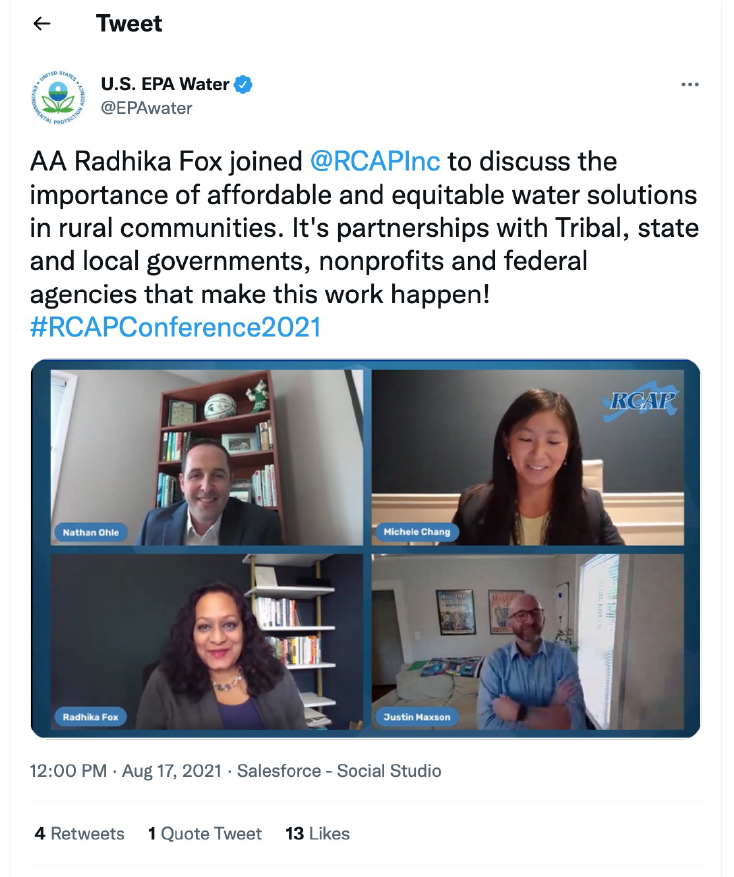
“When you’re looking into a ditch at a water break or in a pile of papers trying to sort out a community’s finances, it is hard to see the number of lives touched by the work we do every day. This morning encouraged me!”
From National Conference 2021 Chat comments
Elevating Rural Voices on the National Stage
In 2021, our training work included more systems and attendees than ever before. During the pandemic, we continued to innovate to provide services to communities, even during lockdowns. We were able to shift more trainings online – adapting to the moment, expanding our audience, and becoming leaders in using these remote technologies. While we missed in-person interaction we were able to increase our virtual reach into more difficult-to-reach communities and were able to reduce the time and costs required to travel to a central location. As the world shifts back to in-person, we will continue to use some of the technologies and lessons learned in future trainings – blending in-person and remote techniques.
-
-
Ines Polonius, CEO of Communities Unlimited (Southern RCAP) and RCAP Board Member, testified before the U.S. House Agriculture Subcommittee on Commodity Exchanges, Energy, and Credit. Ines’s testimony focused on the importance of USDA-RD (Rural Development) Water Infrastructure Programs and the need for increased USDA-RD funding.
-
Nathan Ohle, RCAP’s former CEO, testified before the U.S. House Committee on Small Business, Subcommittee on Underserved, Agricultural, and Rural Development. Nathan’s testimony brought attention to the critical role rural small businesses and entrepreneurship has in supporting the U.S. economy while it recovers from the COVID-19 pandemic
-
Vikki Pettman, the Delaware and Maryland State Manager for SERCAP (Southeast Rural Community Assistance Project, or Southeast RCAP), testified in front of the U.S. Senate Committee on Environment and Public Works. During the field hearing, Vikki described the impacts of COVID-19 on small systems in Maryland and Delaware and emphasized the importance of key RCAP programs to minimize these impacts.
RCAP also helped secure funding for historic levels of investment in water infrastructure, rural development, and broadband in the American Rescue Plan, and the Bipartisan Infrastructure Law.
Research at RCAP
RCAP’s research spanned economic development, the impacts of COVID-19, and regionalization
Developing Regional Economic Connectivity
In June 2021, RCAP and the National League of Cities (NLC) published the report “Developing Regional Economic Connectivity: Key Factors and Strategies for Urban and Rural Communities”. The report emphasizes the importance of shifting the current paradigm of economic development from competition to collaboration to promote greater prosperity and equity for all communities, including rural communities.
Key recommendations from the report:
- Develop an inclusive innovation ecosystem.
- Ensure access to broadband and digital inclusion.
- Align workforce skills with industry needs.
- Enable strong regional organizations and business participation.
- Read the report.
Regionalization
In May 2021, RCAP released a new report, “Regionalization: RCAP’s Recommendations for Water and Wastewater Policy,” which focuses on local, state, and federal policies that encourage and hinder regional solutions. It includes recommendations at all levels of government to better support regionalization (meaning any type of partnership or collaboration between water/wastewater utilities) moving forward.
Two key takeaways:
The need for flexibility. Policy at the federal, state, and local levels should allow for as many ways of implementing, encouraging, and incentivizing regionalization as possible. This should be paired with capacity-building opportunities for communities to access those options so that each community can find the right solution for its unique needs.
The need for more funding for regionalization efforts, across the spectrum of informal to formal regionalization, from all levels of government. This includes direct funding to communities/systems as well as funding for technical assistance providers like RCAP to help facilitate these complex processes Read the report.
Customer Debt and Declining Revenues
In May, the Pacific Institute, Rural Community Assistance Corporation (RCAC – The Western RCAP) and RCAP coauthored a new report, Customer Debt and Declining Revenues: The Financial Impacts of COVID-19 on Small Community Water Systems, which builds on an early survey of our network. The report expands our understanding of the emerging impacts of the pandemic, uses case studies to show how the pandemic is individually affecting small water systems, and proposes policy recommendations to address these effects Read the report.
Research Edition of Rural Matters
For the first time, RCAP produced a special research edition of Rural Matters, RCAP’s official magazine with over 10,000 subscribers. The issue featured all our recent research and data affecting rrural communities, to help readers gain greater awareness for the issues and understand the efficacy and impact of our work Read the report.

For the Journey Ahead
We’ve learned that…
Growing our impact is critical AND also requires great care. We have doubled down to serve more people and communities this year than ever before. We are driven to do more, and we know we must expand thoughtfully both inside and out to bring about lasting change. We continue to honor our roots in water and wastewater but grow in thoughtful ways to address needs beyond the sector so we can holistically serve rural communities and help them achieve their visions for the future.
We must accept and adapt to a post-COVID world. We bounced back from the first year of the pandemic by helping more communities in a hybrid capacity. We must embrace the new realities and constraints before us with technology, innovation, creativity, and a learning mindset.
Rural voices and communities must always center our national efforts. At the heart of our work are the unique, textured, and courageous individuals and communities that define rural America. Our efforts to elevate rural voices on a national scale depend on our commitment to this deep connection.
Great strides in safer water and greater economic prosperity in rural America are possible TOGETHER. Historic national investments and commitments were made in the water space in 2021. We stand at the ready to work alongside communities, partners, and policymakers to make the most of this once-in-a-generation milestone.
Financials
Income
Expenses

FEDERAL GRANTS & CONTRACTS
20,142,038
OTHER GRANTS & CONTRIBUTIONS
$3,685,005
CONFERENCE & REGISTRATION FEES
$400
MEMBERSHIP DUES
$48,000
INTEREST INCOME
$2,401
IN-KIND CONTRIBUTIONS
$201,611
DRINKING WATER & WASTEWATER
$18,862,486
SOLID WASTE
$993,414
RESEARCH & ECONOMIC DEVELOPMENT
$1,836,620
MANAGERIAL
$209,053
DEVELOPMENT
$17,323
With Gratitude
RCAP’S work is powered by the generous support of donors and partners. We thank them for their continued support and commitment to rural America.
- 120Water
- Arizona State University
- Chris Long Foundation
- CoBank
- Cynthia and George Mitchell Foundation
- ESRI
- Every Library
- Heartland Forward
- Individual Donations
- Infiltrator Water Technologies
- Kauffman Foundation
- Lyda Hill Philanthropies
- National Association of Clean Water Agencies
- Network Kansas
- NFL Foundation
- Pacific Institute
- Robert Wood Johnson Foundation
- Rockefeller Foundation
- Self Help Enterprises
- Siegel Family Endowment
- Spring Point Partners
- Truist Bank
- U.S.Department of Agriculture
- U.S. Economic Development Administration
- U.S. Environmental Protection Agency
- Wells Fargo Bank
- Winward Fund
- Xylem
“It’s not every day that you find a partner that aligns so closely with your values, but when you do, it re-inspires your work and commitment. RCAP is just that partner for CoBank. The meaningful work of Agua4All—getting clean drinking water into rural schools—reflects just one of the many ways that RCAP supports rural communities throughout the country and inspires our entire team at CoBank. We’re proud to support programs like this and groups like RCAP that do this incredibly important work.”
From Chris Shaffner, Senior Vice President and Director of Business Operations, CoBank
